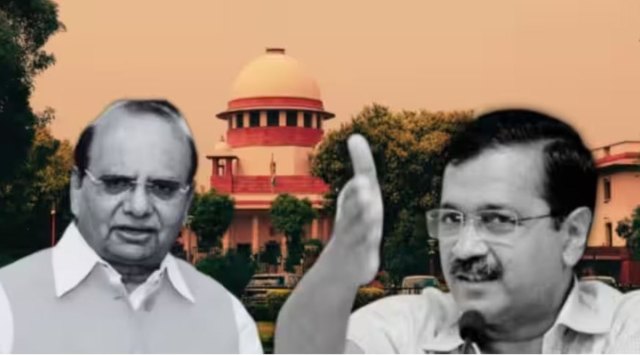A three-judge Bench presided by Chief Justice of India D Y Chandrachud said there is an “apparent conflict between the two clauses” of Article 239AA “on the nature of law-making power vis-à-vis NCTD’s constitutional structure of governance” and it “needs to be resolved by this court”.

Explaining this, the Bench, also comprising Justices P S Narasimha and Manoj Misra, said “a primary reading of Article 239-AA(7)(a) indicates that the law shall not alter the existing constitutional structure envisaged for NCTD in Article 239-AA.
Story continues below this ad
However, a prima facie reading of Article 239-AA(7)(b) denotes that the law enacted under Article 239-AA(7)(a) could alter the existing constitutional structure of governance of NCTD”.
“The power of Parliament to enact a law granting the Union of India executive power over services is not in contention. It is now a settled position of law. However, this court, while deciding the constitutional validity of the 2023 ordinance, must decide if the exercise of such a power is valid,” the Bench said.
The court framed two questions to be answered by the Constitution Bench: “What are the contours of the power of Parliament to enact a law under Article 239-AA(7); and whether Parliament, in the exercise of its power under Article 239-AA(7), can abrogate the constitutional principles of governance for NCTD”.
The Delhi government had also sought a stay of the ordinance. Dismissing the plea for a stay, the Bench said the parties can approach it for the hearing before the Constitution Bench after it completes hearing on petitions challenging the constitutional validity of amendments made to Article 370 of the Constitution.
Story continues below this ad
Appearing for the Delhi government, Senior Advocate A M Singhvi said he was “not at all agreeing to a reference” as “the whole system is in paralysis because of the time it will take (for a Constitution Bench hearing)”.
He said that if the court decided to refer the matter, he would request an early date. “This is a very short point,” he said, as he urged the court to take it up before the Article 370 matters.
The Bench, however, rejected his request, saying it has already fixed the schedule for hearing the Article 370 petitions and cannot change that now.
“We will not change the scheduling of the 370 matter now. We have notified it. Counsel have been getting ready. We said that we will hear Article 370 and now for us to say that we will not hear that will not be right,” the CJI said.
Story continues below this ad
Singhvi urged the court to “see what is happening in the meanwhile”. “No bureaucrat is taking orders,” he said, and questioned how the Lieutenant-Governor could remove 437 consultants appointed by the AAP government.
“Assuming the ordinance is valid, how does the L-G have the power, even under the ordinance, to remove the consultants appointed by the NCT? He does not have the power to run the Delhi administration,” he said.
Opposing the submission, Senior Advocate Harish Salve, appearing for the L-G, said: “He (L-G) has not done it under the ordinance”.
Salve said there were “rank illegal appointments of people who, just by coincidence, happen to be party workers, following a procedure which is deeply flawed. The special secretary has said these appointments are illegal. You don’t need the ordinance for that”.
Story continues below this ad
Intervening, the CJI said: “What you have effectively done is that though the Constitution says entries 1, 2 and 18 (are) the only entries over which the Legislative Assembly has no jurisdiction, (you) have, by an ordinance, amended the Constitution to say entry 41 of list 2 is also beyond the legislative power of Delhi Assembly. That’s what section 3A (of the ordinance) does”.
Salve, however, said “Section 3A may not survive when the Bill is introduced in Parliament. 3A is unnecessary.”
The CJI then said, “we can’t assume today that 3A will not be introduced”.
“Let’s assume Your Lordships have struck down 3A, or Your Lordships have stayed its operation. Look at Section 5. It is Parliament exercising legislative power, which Your Lordships say it can to set up a structure,” Salve responded.
Story continues below this ad
The Bench then said it would refer the matter to a Constitution Bench and upload the order on the SC website later in the day.
On May 11, a five-judge Constitution Bench headed by the CJI had held that the National Capital Territory administration is unlike other Union Territories and has been accorded a ‘sui generis’ (unique) status by the Constitution. It had asserted that an elected government needs to have control over bureaucrats, failing which the principle of collective responsibility will be adversely affected.
On May 19, the Centre promulgated the Government of National Capital Territory of Delhi (Amendment) Ordinance, 2023 to set up a National Capital Civil Service Authority for transfer and posting of Group-A officers in Delhi. The Chief Minister is one of the three members of the Authority, while the two others are bureaucrats. The decisions by the Authority are to be taken by a majority and, in the event of a dispute, the matter will be referred to the L-G whose decision will be final.









